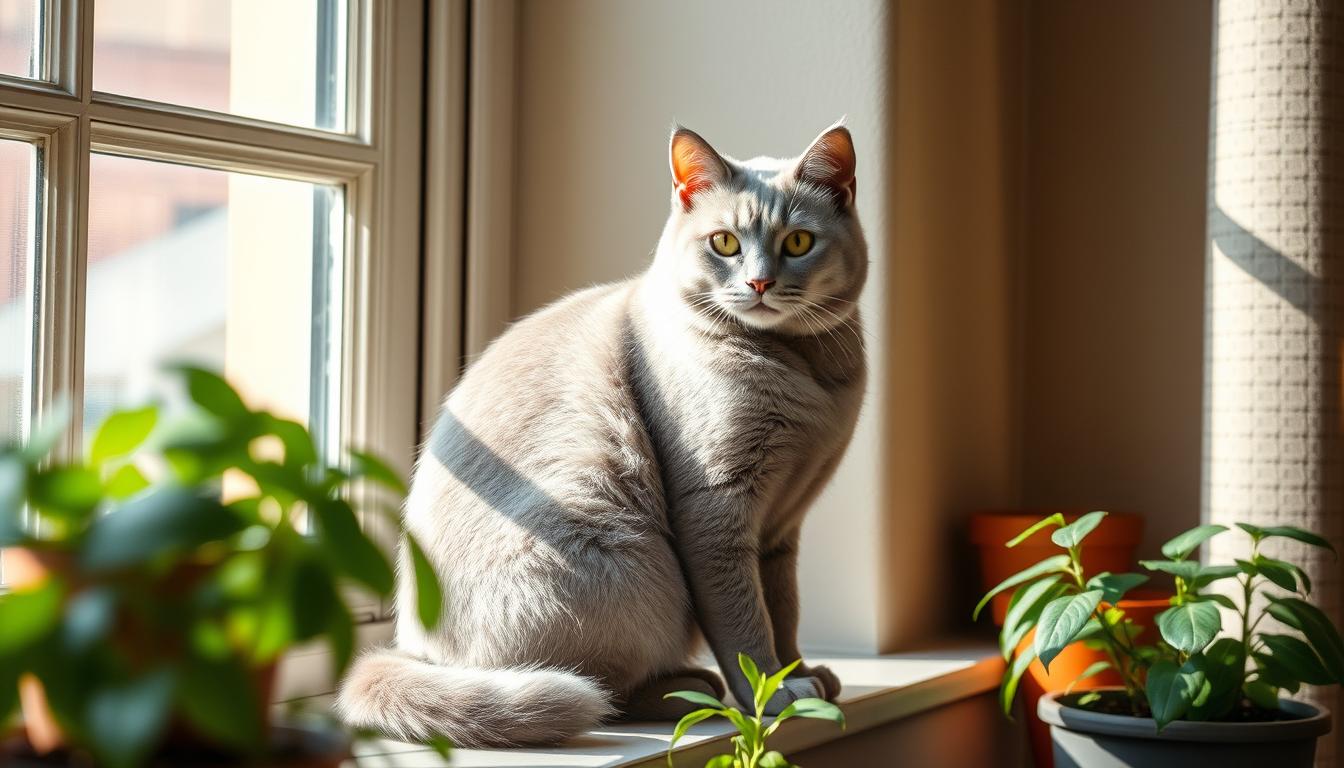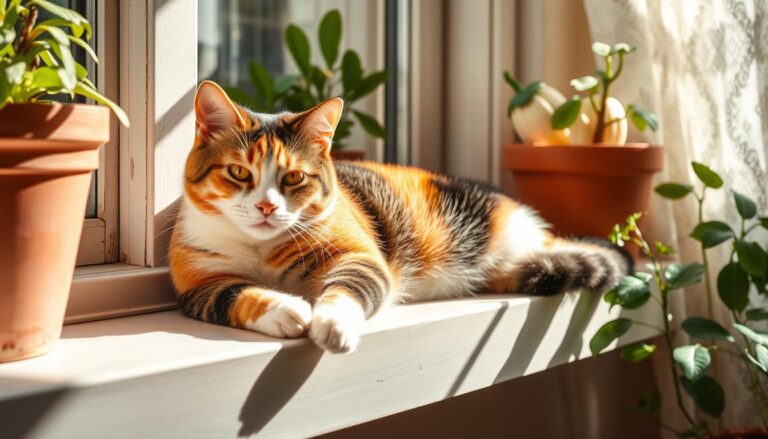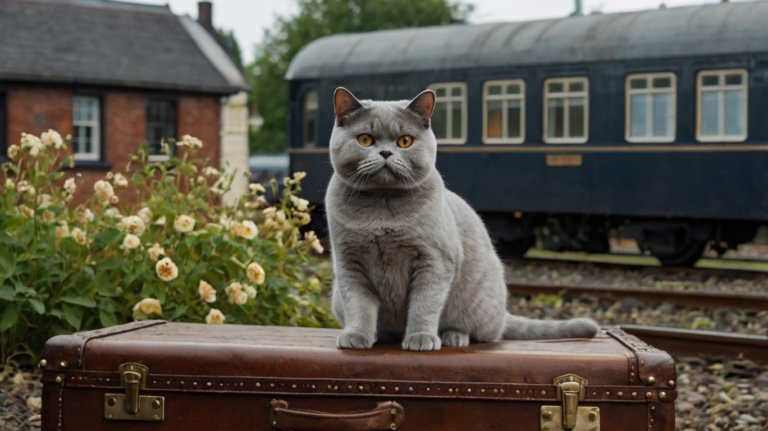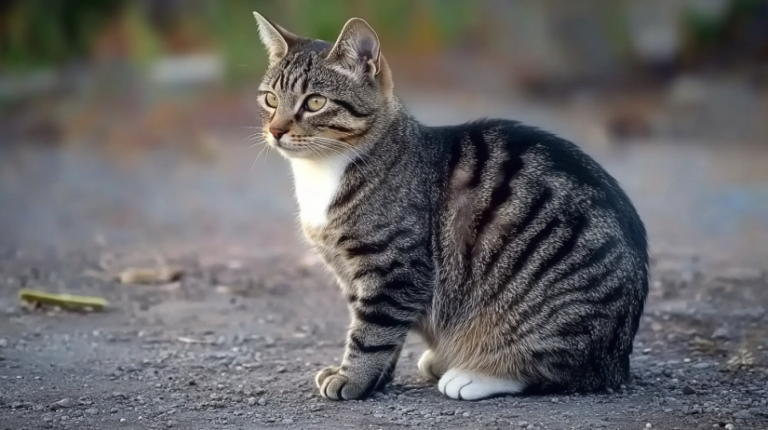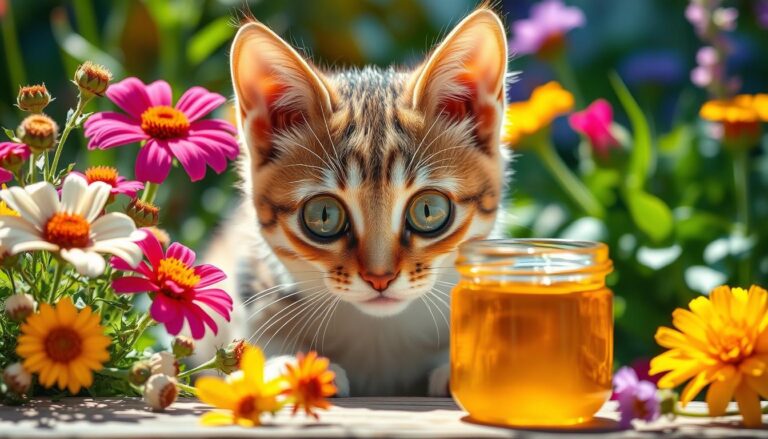Discover the Magic of Korat Cats: Personality, Care, and More
I’ve always loved cats, and one breed stands out to me – the Korat cat. Their silver-blue coats and green eyes are mesmerizing. Their quirks have won my heart since I first saw one.
Korat cats come from Thailand’s Korat province. They are a mix of grace, smarts, and fun. Their history is fascinating, drawing cat lovers worldwide. We’ll explore their personality, care needs, and why they’re great pets.
Korat cats are perfect for anyone who loves cats. They’ll win your heart and inspire your creativity. Let’s dive into the world of Korat cats and see why they’re so special.
Introduction to Korat Cats
Origin and History of Korat Cats
The Korat cat comes from the Nakhon Ratchasima province of Thailand. They have been seen as symbols of good luck for centuries. First mentioned in a text from around 1350, their unique silver-tipped blue coat and heart-shaped face have won hearts globally.
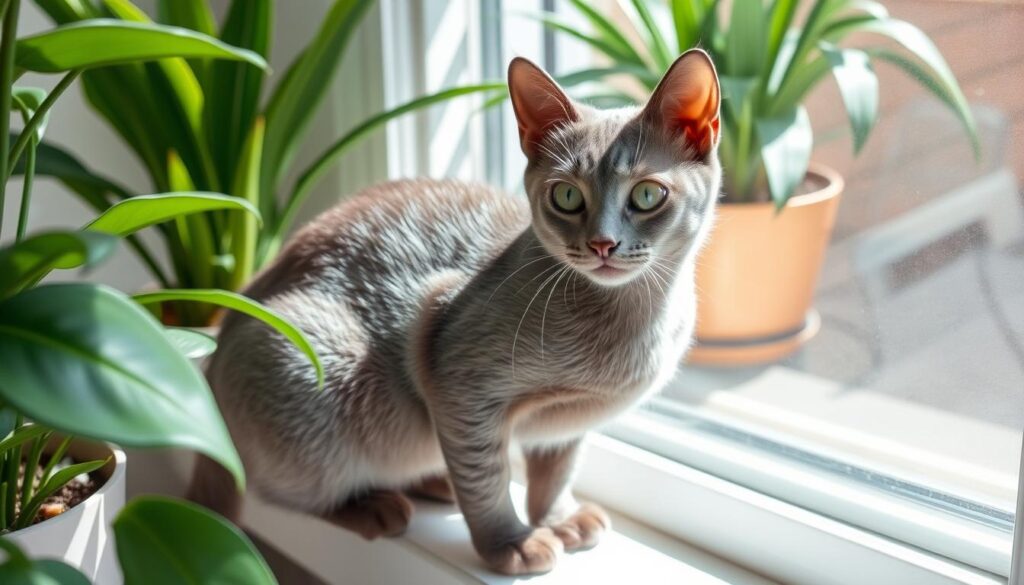
These medium-sized Siamese Cat Breed are among Thailand’s 17 “good luck” cats. Their rich history has made them even more special, adding to their Feline Royalty status.
Recognizing Their Distinctive Traits
Korat cats have a short, shimmering coat with a silver-tipped blue color. Their heart-shaped faces, large green eyes, and strong build make them stand out. They weigh between 6 to 10 pounds and take up to 5 years to fully grow.
Despite their small size, Korats have a big presence. They carry themselves with grace and elegance, winning the hearts of many Feline Royalty fans.
Korats are a rare breed with a small gene pool, making them a true Siamese Cat Breed gem. They live up to 10 to 15 years, becoming loyal and loving companions for many years.
Personality Traits of Korat Cats
Korat cats are known for being very affectionate and loyal. They love to be close to their owners, earning them the nickname “velcro cats.” These cats enjoy playing and solving puzzles, showing their intelligence.
Affectionate Companions
Korat cats are very loving and enjoy cuddling. They like to follow their owners around the house, looking for attention. They can sense their owner’s feelings, making them great Affectionate Companions.
Social Behaviors and Playfulness
Korats are playful and love to play games and solve puzzles. They enjoy being around other pets and can learn tricks easily. These Intelligent House Pets are quick to learn and fun to train.
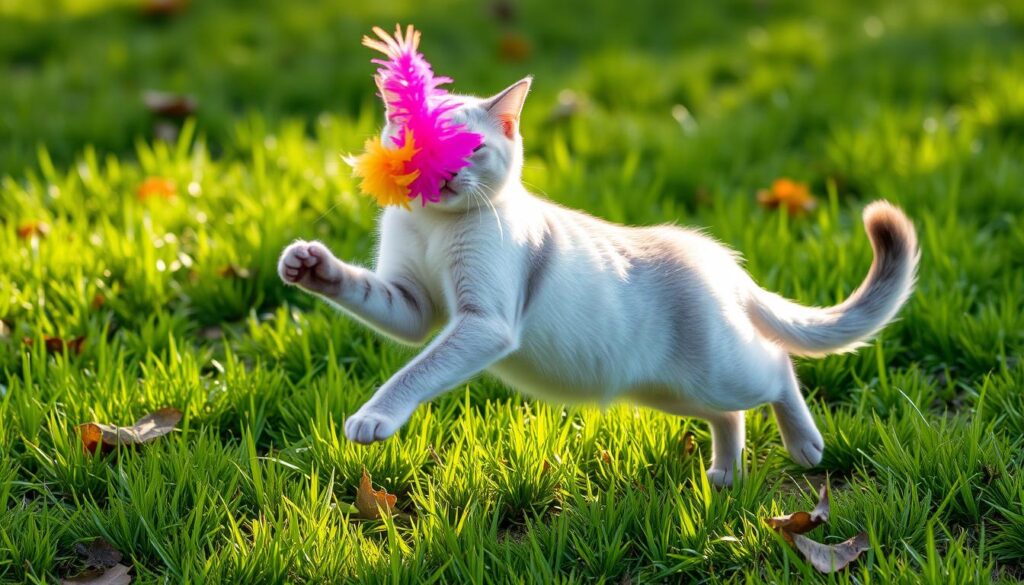
Intelligence and Trainability
Korats are very smart and easy to train. They enjoy making their owners happy and pick up new skills. Their curious nature and problem-solving skills make them great Intelligent House Pets.
| Personality Trait | Description |
|---|---|
| Affectionate | Korats form strong bonds with their human companions and enjoy snuggling and cuddling. |
| Social | These cats thrive on interactive play and can form bonds with other pets in the household. |
| Intelligent | Korats are quick learners and can be trained to perform various tricks through positive reinforcement. |
Care Requirements for Korat Cats
Caring for Korat Cats means paying attention to a few important things. This includes their diet, grooming, and health. Let’s explore what these blue fur felines need to stay happy and healthy.
Nutrition and Diet
Korat Cats need a diet full of high-quality protein. This supports their active lifestyle. Choose cat food with at least 41% essential nutrients. It should also have up to 77% human-grade animal meat.
This ensures your Korat Cat gets the nutrients they need. It also keeps their weight stable and healthy. You can expect to spend $20 to $27 each month on their food.
Grooming Needs
Korats have a short, fine coat that’s easy to care for. Brushing them once or twice a week keeps their blue fur looking great. Ensure their nails, ears, and teeth are well cared for.
Plan to spend $10 to $20 monthly on grooming services. It keeps them feeling good and looking great.
Health Considerations
Korat Cats are usually healthy, living 11 to 15 years on average. But, they might get certain genetic conditions like GM1 and GM2 gangliosidosis. Frequent vet checkups and care keep them healthy.
Monthly vet expenses for a Korat Cat are about $7 to $9. By meeting their unique care needs, you can give them a happy, healthy life with your family.
Creating a Safe Environment for Korat Cats
Creating a safe and fun space is key for your Korat cat’s happiness. These cats love to play and explore. They need a place that meets their needs and lets them be their best selves.
Essential Supplies and Accessories
Make sure your Korat cat has everything they need to be comfortable and happy. Here are some must-haves:
- Scratching posts and cat trees for their natural scratching
- Interactive toys like puzzle feeders and catnip toys to keep their minds sharp
- Cozy beds and hideaways for rest and relaxation
- Good food and water bowls to keep them healthy
- Clean litter boxes to keep their living space fresh
Safe Spaces for Play and Rest
Korat cats are full of energy and curiosity. They need safe places to play and rest. Here are some ideas:
- A play area with cat towers, perches, and toys for fun and exercise
- Quiet spots like window beds or cat trees for naps
- Cat-proofed rooms or zones to keep them safe from dangers
Korats are not fully hypoallergenic but produce fewer allergens than some breeds. They can be a great choice for people with mild allergies. With the right care, your Korat cat will be happy and bring joy to your home.
Understanding Their Communication
Korat Cats are known for their soft, melodious voices. They use these voices to share their feelings and needs. They chirp, trill, and meow to send messages. Knowing how to read their vocalizations and body language helps you connect with them better.
Vocalizations and Body Language
Korat Cats are very expressive. They purr and chirp when they’re happy, and meow loudly when they need attention. They also use body language like ear positions and tail movements to communicate.
Interpreting Their Behaviors
Watching a Korat’s behavior can tell you a lot about what they need. They love to be close to you, often curling up in your lap. They also love to play and look around. Paying attention to their cues helps you meet their needs and create a happy home for them.
Learning to understand Korat Cats is a rewarding experience. It strengthens your bond with them. By listening to their voices and body language, you can better meet their needs and enjoy a fulfilling friendship.
Fun Activities for Korat Cats
Korat cats are smart and love to play. They enjoy tasks that keep their mind and body active. These Blue Fur Felines are always up for an adventure.
Interactive Playtime Ideas
- Play fetch with your Korat using a light ball or toy.
- Try puzzle feeders or toys filled with treats to test their problem-solving skills.
- Use a laser pointer for a fun game of chase, giving them physical and mental exercise.
Mental Stimulation Games
- Teach your Korat simple tricks like “sit” or “shake” to keep their mind sharp.
- Give them places to climb, like cat trees or shelves, to explore and satisfy their curiosity.
- Change their toys often to keep them interested and prevent boredom.
By adding these fun activities to your Korat’s day, you’ll help them stay smart and active. They’ll love the playtime and the bond it strengthens between you.
“Korat cats are renowned for their intelligence and playfulness, making them a delightful companion for active households.”
| Activity | Benefits | Recommended Frequency |
|---|---|---|
| Fetch | Promotes physical exercise, mental stimulation, and bonding | Daily |
| Puzzle Feeders | Engages problem-solving skills and natural hunting instincts | Several times a week |
| Laser Pointer Chase | Satisfies the need for stalking and pouncing | Several times a week |
| Trick Training | Enhances mental agility and strengthens the human-cat bond | Several times a week |
| Vertical Climbing | Allows for natural exploration and exercise | Daily |
| Toy Rotation | Prevents boredom and maintains interest | Weekly |
Integrating Korat Cats into Your Home
Bringing a Thai Cat or Lean Blue Cat home needs careful planning. These cats need a safe, comfy place that meets their special needs. By introducing them slowly to your home and pets, you can make their transition smooth and enjoyable.
Introducing Them to Other Pets
Korat cats are usually friendly and can live well with other pets. Start by introducing them in a calm, neutral area. Let them get used to new smells and sounds at their own speed. Always watch their interactions and reward them for good behavior. With time, your Korat and other pets can become great friends, making your home happier.
Setting Up Their Living Space
To make your Thai Cat or Lean Blue Cat feel at home, create a special area for them. Offer places to climb, like cat trees or shelves, so they can see everything. Ensure they have soft spaces, things to scratch, and interactive toys.Tailoring their space helps them feel safe and happy in your home.
| Characteristic | Description |
|---|---|
| Origin | Thailand (over 600 years ago) |
| Appearance | Sleek, silver-blue coat, large emerald eyes, muscular build, heart-shaped head |
| Temperament | Affectionate, intelligent, playful, social |
| Grooming | Minimal, weekly brushing to maintain coat |
| Health | Generally healthy, prone to some genetic conditions |
| Lifespan | 10-15 years |
“The Korat cat’s enchanting eyes and unique physical features make them a beloved companion for cat enthusiasts worldwide.”
Common Misconceptions About Korat Cats
Korat cats are often confused with Russian Blues because of their similar coats. But, they are truly unique, with a rich history and special traits. Let’s clear up the myths and show the real charm of these cats.
Debunking Myths
Many think Korat cats are aloof, like some Siamese breeds. But, Korats are actually very affectionate and social. They bond strongly with their owners, even if they’re not as loud as Siameses.
Another myth is that Korats bring “good luck” in Thailand. While this belief is important, it doesn’t define their personality. Korats are amazing cats, loved for their looks and their loving nature.
True Facts About Their Behavior
- Korat cats are very smart and love to learn, thanks to positive training.
- They’re not shy at all; Korats are playful, curious, and love to play with their owners.
- These Siamese Cat Breed cousins are very loyal and form deep bonds with their families. They often follow their humans everywhere.
By clearing up myths, we can see Korat cats for what they truly are. They are Feline Royalty – loving, smart, and a joy to have at home.
| Myth | Reality |
|---|---|
| Korats are aloof, like Siamese cats. | Korats are known for their affectionate and social behavior, forming strong bonds with their owners. |
| Korats are “good luck” cats in Thailand. | While this cultural belief holds significance, it does not directly translate to their personality or behavior. |
| Korats are not responsive to training. | Korats are highly intelligent and respond well to positive reinforcement training. |
Conclusion: The Joy of Owning a Korat Cat
Owning a Korat cat is a rewarding experience. They are affectionate and intelligent. Their rich history and unique looks make them a joy to have around.
These cats are loyal and playful. They form strong bonds with their owners. They are great family pets.
Final Thoughts
Korat cats are stunning with their silver-blue coats and green eyes. They are gentle and tolerant. They love to play and enjoy being with their humans.
Encouragement to Consider This Breed
If you’re interested in Korat cats, consider getting one. They can be found through reputable breeders or rescue groups. A Korat cat can bring joy and fulfillment to your life.

